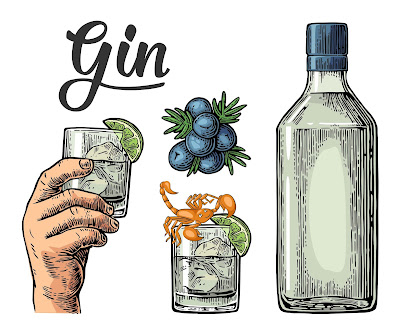All About Gin
So far in Savage Scorpions' "All About" series we've covered rum, tequila, vodka, and whiskey. Today it's gin's turn to hit the spotlight. Each of these lovely liquids is made and taste differently, but they all have one thing in common. They each pair perfectly with our creative cocktail garnish!
What is Gin
Gin gets its predominant flavor from juniper berries. The drink we enjoy today evolved from an herbal medicine in the Middle Ages to an object of commerce in the spirits industry. Gin was based on an old Dutch liquor, jenever, which is the juniper-flavored national and traditional liquor of the Netherlands and Belgium. During the Eighty Years' War, English soldiers drank genever before a battle for its calming effects, which is where the term "Dutch Courage" probably originated from.
To be classified as gin in the United States, the alcoholic beverage must have no less than 40% ABV (80 proof) and possess the characteristic flavor of juniper berries. Gin produced only through distillation or redistillation of aromatics with an alcoholic wash can be further distinguished and marketed as "distilled gin."
Over time, much like other liquors, many different styles of gin have evolved. Legally it has been separated into four categories in the European Union.
What is Gin
Gin gets its predominant flavor from juniper berries. The drink we enjoy today evolved from an herbal medicine in the Middle Ages to an object of commerce in the spirits industry. Gin was based on an old Dutch liquor, jenever, which is the juniper-flavored national and traditional liquor of the Netherlands and Belgium. During the Eighty Years' War, English soldiers drank genever before a battle for its calming effects, which is where the term "Dutch Courage" probably originated from.
To be classified as gin in the United States, the alcoholic beverage must have no less than 40% ABV (80 proof) and possess the characteristic flavor of juniper berries. Gin produced only through distillation or redistillation of aromatics with an alcoholic wash can be further distinguished and marketed as "distilled gin."
Over time, much like other liquors, many different styles of gin have evolved. Legally it has been separated into four categories in the European Union.
- Juniper-Flavored Spirit Drinks
Produced by pot distilling a fermented grain mash to moderate strength, then redistilling it with botanicals to extract the aromatic compounds. Sometimes labeled as Wacholder or Ginebra, it must be bottled at a minimum of 30% ABV. - Gin
A predominately juniper-flavored spirit made simply be adding approved natural flavoring substances to a neutral spirit of agricultural origins. - Distilled Gin
Produced exclusively by redistilling ethanol of agricultural origin with an initial strength of 96% ABV in stills traditionally used for gin in the presence of juniper berries and of other natural botanicals. The predominant taste must be that of juniper. - London Gin
Obtained exclusively from ethanol of agricultural origin with a maximum methanol content of 5 grams per hectolitre of 100% ABV equivalent. The flavor is introduced exclusively through the re-distillation stills of ethanol in the presence of all the natural plant materials used. The resultant distillate is at least 70% AVB. London gin may not contain added sweetening exceeding 0.1 grams of sugars per liter, nor colorants, nor any added ingredients other than water.
Drinking Gin
Most people don't enjoy the taste of gin as a straight shot, so it's probably not going to be your liquor of choice for a scorpion shot. (We guess that really depends on just how savage you are!) Gin does, however, make a delicious cocktail that one of our Savage Scorpions would be proud to be a part of.
For example, martinis were originally made with gin rather than vodka. A Gin & Tonic is a popular drink made up of gin and tonic (we hope that was already obvious to you!) and if you use club soda in place of the tonic, it becomes a Gin Rickey. Another popular gin cocktail that any bartender should know how to mix is a Tom Collins. The only thing you may need to ask them to add to these recipes is a Savage Scorpion! Then it will be perfect!
Contact Us
Phone: 949-232-3334
Email: Info@SavageScorpions.com








Comments
Post a Comment